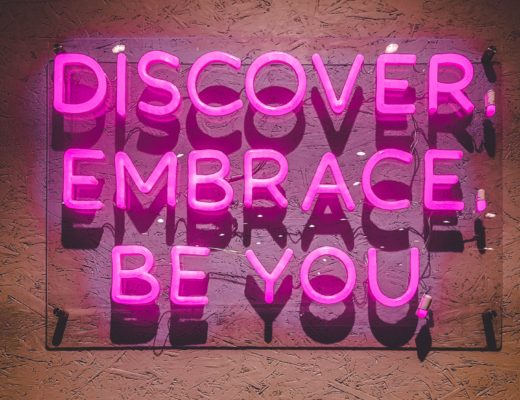Today, I’m sharing a story that’s deeply personal. It’s one that, until now, only a handful of my closest friends and family know. I’m doing this because this story is what led me on a journey of self-discovery and healing that, four years later, has led to the creation of this mental health blog. I’m also doing this because I want people to know there’s no shame in admitting to your struggles with mental health; that life can be really tough and sometimes it can be difficult to cope – and that’s okay.
One night almost four years ago, I was on the brink of ‘insanity.’
And yes, I mean literally.
A monumental loss
I found myself back at my mum’s house after living away from home for more than a decade. I was homeless, aimless, and heartbroken. I had lost everything. My partner, an adventure of a lifetime, all direction. My future, which up until that point seemingly unfolded on a distant, beautiful horizon had shriveled up to the size of a pea, and all that once seemed possible now felt out of reach, pointless, and painful.
My relationship of three years came to an abrupt and brutal end in 2015. It was one of those breakups that came out of nowhere and knocked me for six. Add to that the man who I was supposed to marry and start a business and a family with was engaged to another woman within weeks of us breaking up, you can begin to imagine the magnitude of the trauma.
Picture it. You’re in a relationship with the person you see yourself spending the rest of your life with. This is the man who you firmly believe will be by your side through thick and thin. You also believe he’s the ‘one’ for you (I now know that I was completely wrong, but that’s a story for another time), someone you share everything with, someone your family has grown to love and regard as one of their own.
Then, in the blink of an eye, the life you built together shatters like a piece of china hitting a brick wall at full force.
I was completely and utterly floored. And I don’t say this lightly.
A glimpse of “insanity”
Back to that night four years ago. It was approximately three months after the breakup. Every single day, I had anxiety and a pain in my chest that never dissipated. My mind was relentlessly trying to find answers that didn’t exist, and I was exhausted. I was lying on my bed, and I had begun another night of staring into the darkness, battling with what I can only describe as excruciating emotional pain. I have never suffered pain like that – a lethal cocktail of loss and grief and confusion, which tears you up bit by bit inside.
I can only assume that it all became too much. As I lay there in the dark, I was flooded with emotional pain. I’ve tried in the past, in vain, to find the words to describe it and do it justice, and to this day I still haven’t been able to. Perhaps it’s a defence mechanism, because I really cannot seem to sum it up in eloquently. All I know is that it was excruciating. Excruciating, raw pain that comes from grief and confusion and loss.
That night, my brain offered me an escape route.
Until then, I had no idea what it meant to be on the ‘brink of insanity.’ It’s an expression we use often but one that we never fully understand unless we’ve been at that edge. That night, I was there. On the brink. The only thing separating me from this so-called thing called sanity from insanity was a flimsy little thread.
I believe that my distressed brain decided to offer me some relief in the form of a way out. I knew, as I lay there and saw this opening, that this ‘place’ – whatever it might have been – would have offered me respite from the relentless thoughts and feelings. I knew that going to that space would have made the pain stop. I knew that it would have momentarily made me feel better.
I also knew, instinctively, that this ‘place’ was a bad place, and that if allowed myself to drift to it, I would never be the same person again.
I knew that I was on the brink of insanity. Don’t ask me how, but I just knew it.
Back from the brink
Thankfully, I was able to pull myself back, however painful it was. I honestly have no idea how I managed to; perhaps my survivor instinct kicked in, or perhaps my stubbornness – nothing is going to ‘destroy’ me, and certainly not a guy. I just knew I couldn’t go there, I just knew it would be terribly bad for me.
I also knew then that I had a lot of work to do in order to make myself feel better. It took for a catastrophic life event for me to realise I’d hit rockbottom. The truth is, I had neglected my mental health. Hell, I didn’t even know it was something I was supposed to nurture and take care of.
And you know it’s bad when a psychology graduate isn’t even aware of this.
Back when I was in university, there wasn’t the same amount of emphasis on cultivating strong mental health. Sure, we studied psychology – we learnt about how the human mind worked, but we were never taught how to look after our own mental health.
I had spent most my adult life completely neglecting this. So, imagine binge eating McDonalds and KFC for most of your life and then having to start working on getting healthy. It was as extreme as this.
What followed on from that petrifying night of staring insanity in the face was a journey of self-discovery. A much-needed journey to self-compassion and acceptance that has lasted four years.
Looking after my mental health
What we don’t realise is that if we neglect our mental health, we fail to build resilience, self-compassion, and other important qualities that are shared by those who have good mental health.
It is resilience that helps us to bounce back from shattering life events like the one I went through in 2015. I’m not saying that if I had more resilience back then that I would have bounced back within a day of it all unfolding, but I believe it wouldn’t have floored me in the same way.
The journey I underwent has been anything but easy. It’s been four years of introspection, trial and error, hours of therapy, battling with depression, and trying to rebuild my life. I had to grieve the life I had imagined would unfold for me, accept that it was now gone, try to work on getting stronger, and then figure out what this ‘new’ me wanted and needed moving forward.
When you undergo this kind of experience, your whole view of yourself and the world around you shifts whether you like it or not. And you change drastically (whether it’s for the better or the worse depends on how you choose to act), which inevitably means that you no longer want what you once thought you wanted. And that’s what I’m struggling with right now – trying to figure out what exactly I want and then finding the courage to be vulnerable again and go for it. But again, this is a whole other story.
What I do know is that this journey to better mental health is now a project of a lifetime. Mental health, just like physical health, cannot be neglected, and I will spend the rest of my life prioritising it and doing what’s best for it.
Healing through sharing
So, why am I starting this blog?
After I stared ‘insanity’ in the face, it took me a long time to share the experience with anyone and I guess it’s because on some level I felt ashamed. How could I admit to something like that? Would it make people think I was unstable in some way? Would they judge me or think less of me?
Over the last four years, I’ve also been diagnosed with recurrent moderate to mild depression. When my therapist first even suggested that I might be depressed I took it so personally. I didn’t want to even hear the word depression, let alone begin to acknowledge that perhaps she was right – I was depressed. It was only during the second episode that I started to realise that yes, I had a bit of a problem and that I’d been ashamed to admit it to myself.
It then occurred to me that there’s still so much shame in sharing these stories, so much shame in labels like ‘depression,’ ‘anxiety,’ and ‘bipolar,’ so much shame in acknowledging that you might need help. But why? On an average day, life is already full of challenges, so what about when it throws you a massive curveball? Then life becomes majorly fucking hard, so why should that be a source of shame?
I’m glad that the conversation surrounding mental health is changing for the better and that we’re increasingly becoming more aware of how important it is to look after it. But this is also the era of Instagram and airbrushing. It’s also the era of curating our lives and finding the ‘best of’ to paint a pretty picture on social media. It’s also the era of Trump and Brexit and recessions and a multitude of other triggering world events that are contributing to a world that’s full of anxiety.
It’s okay NOT to be okay
More than ever, we need more people to share these stories of struggle and adversity and to admit that, sometimes, we’re not okay. That sometimes, life is so tough that we struggle. By sharing these stories, we will all, hopefully, start to feel less alone. We’ll also start to become more authentic, vulnerable, and open.
By starting a mental health blog, I want to try and help break the stigma that still surrounds talking about our mental health, while also offering a resource for those who are interested in how to get stronger mentally. I want to emphasise how important it is to look after our minds.
I’m someone who’s struggled with depression for the last few years, and perhaps I always had but didn’t know to label it as such. And depression alone still carries so much stigma that I can only imagine how it must be for people struggling with things like bipolar and schizophrenia. While I don’t have the right amount of experience to provide resources for mental illnesses, I want to acknowledge here that these voices should also be heard, and I will try to provide a platform for those in the future.
I don’t have all the answers, nor am I overestimating the effect a tiny mental health blog like this one will have. But if I can make a bit of a difference to even one person’s life by providing content that contributes to the conversation on mental health and resources on how to improve it, I’ll sleep a lot better at night.
So, welcome to the blog. I hope you find what you need here. For some information on how to use this site, please click here.
Important note: If you are struggling with suicidal thoughts, please reach out to someone. While resources in the UAE are somewhat limited, UK-based charity The Samaritans are reachable in a number of ways, including an email service. Click here to find out more.




